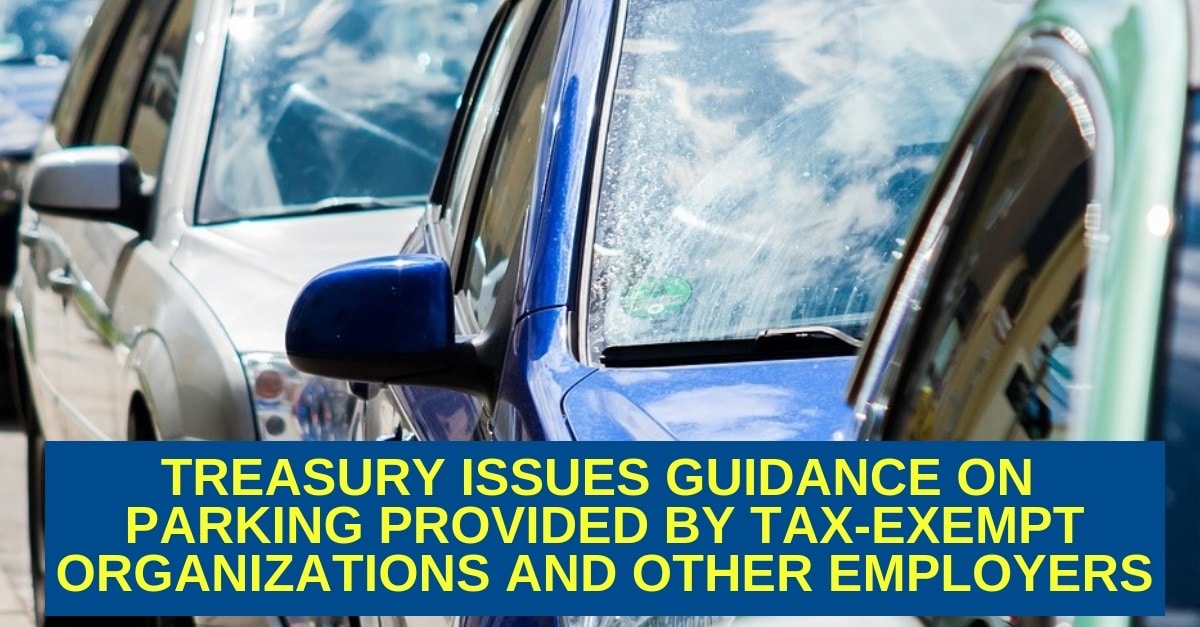
On Monday, December 10, 2018, the U.S. Treasury Department provided additional guidance on how tax-exempt organizations can compute unrelated business taxable income resulting from parking provided to their employees. The guidance is intended to help employers better understand their new tax situation as it pertains to employee parking. Below is CBM’s overview of the new guidance.
In most cases, employer-paid commuting and parking is considered a qualified transportation fringe benefit (QTFB). Because of the 2018 Tax Cut and Jobs Act, tax-exempt nonprofits providing QTFBs to their employees will now have to pay taxes on such benefits.
The current Draft 2018 Form 990-T instructions has specific reporting information for organizations who are to file Form 990-T only for Qualified Transportation Fringe Benefit imputed income. How does that work for those fiscal year organizations filing the 2017 Form 990-T?
If the same rationale is used on the 2017 Form 990-T, then completing the form would entail the following:
- The headings section, except C, E, H, and I;
- Part I, Line 12 (for amount of “disallowed fringes” Section 274)
- Part II, Line 33 (Specific deduction, generally $1,000)
- Part IV, Line 44, Total Tax (including a statement with the 21% tax calculation)
- Signature area
Based upon the 2018 instructions, it does not appear that an organization can utilize any deductions, including charitable contributions, against this disallowed fringe imputed income.
From 2018 Form 990-T Instructions (Draft), Page 5:
Qualified Transportation Fringe Benefit UBTI Only
Organizations that are required to file Form 990-T only because they have UBTI in excess of $1,000 under section 512(a) (7) for expenses for certain qualified transportation fringe benefits must complete the following.
- The heading (above Part I) except C, E, H, and I;
- Part III and IV (complete only the relevant lines); and
- Signature area
For organizations that have employees, unrelated business taxable income (UBTI) is increased by new Internal Revenue Code section 512(a)(7). Under section 512(a)(7), UBTI is increased by any amount for which a deduction is not allowable because of section 274 and which is paid or incurred by the organization after December 31, 2017, for any qualified transportation fringe (as defined in section 132(f)), or any parking facility used in connection with qualified parking (as defined in section 132(f)(5)(C)). This rule does not apply to the extent the amount paid or incurred is directly connected with an unrelated trade or business which is regularly carried on by the organization. For organizations with a fiscal tax year that begins in 2017, enter the amount of any increase in UBTI on line 12 of the 2017 Form 990-T.
There are two types of disallowance calculations. The first is for cases where the employer pays a third party for the use of its parking lot for the employer’s employees. The second is for cases where the employer owns or leases the parking lot.
When an employer contracts with a third party for the use of the parking lot, the expense disallowance under the Code is generally the amount that the employer pays to the third party. However, if that monthly amount exceeds $260 an employee, the employer must treat the excess as additional compensation to the employee. Thus, the monthly amount exceeding $260 is excluded from the disallowance amount and is deductible as compensation.
Where the employer owns or leases the parking lot, the IRS until it issues further guidance, will allow employers to use any reasonable method to calculate the expense disallowance, based on the total cost of providing parking.
The IRS has recognized that new rules may cause some exempt organizations to owe unrelated business income tax for the first time and require them to pay estimated income tax. These organizations would not be able to use the preceding-year tax safe harbor. They may need more time to develop knowledge and processes to comply with estimated tax payment requirements.
Therefore, the IRS is waiving the penalty for failure to make estimated income tax payments for an exempt organization that:
- Provides qualified transportation fringes to an employee for which estimated income tax payments, affected by changes made by TCJA to Code section 274 and Code section 512 would otherwise be required to be made on or before December 17, 2018;
- Provides qualified transportation fringes to an employee for which estimated income tax payments, affected by changes made by TCJA to Code section 274 and Code section 512 would otherwise be required to be made on or before December 17, 2018;
- Timely pays the amount reported for the tax year for which relief is granted
We will continue to update you on these provisions, as the IRS issues further guidance.
Councilor, Buchanan & Mitchell (CBM) is a professional services firm delivering tax, accounting and business advisory expertise throughout the Mid-Atlantic region from offices in Bethesda, MD and Washington, DC.



